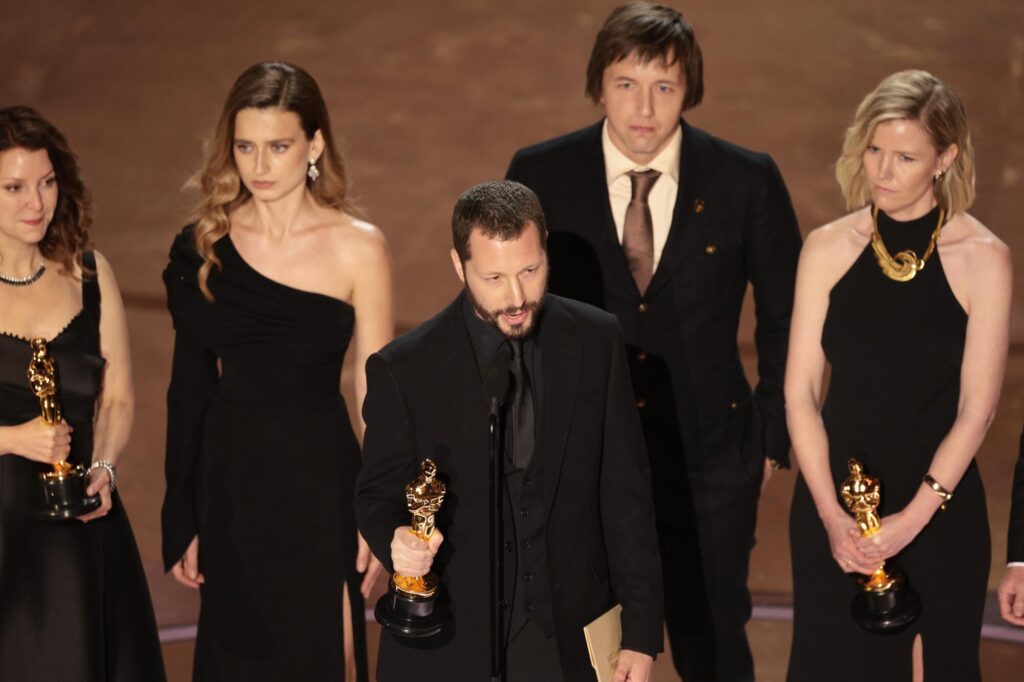If you did not, for instance, down a double shot of espresso on the way out of the Governors Ball, or stop to buy a chicken salad sandwich in your tuxedo at Ralphs on your way home, you may have taken the responsible route Sunday and turned in at a reasonable hour. In which case the Times staffers who did stay out past their bedtimes are happy to help you catch up on the 96th Academy Awards before you’re flat-footed at the office watercooler.
Below are the top five takeaways from the 2024 Oscars, from those of us who were in the room.
1. The five-presenter format for the acting categories needs to stay. For good. It’s been since 2010 that the motion picture academy made its short-lived foray into the “Fab Five” format, but few Oscar hounds will forget Stanley Tucci professing his love for Meryl Streep or Shirley Maclaine giving Anne Hathaway the compliment of a lifetime? Sunday’s revival proved a potent reminder of why it succeeded so brilliantly then, and why it deserves to become an Oscar tradition for the next 100 years: From Lupita Nyong’o reducing Da’Vine Joy Randolph to tears even before she won for “The Holdovers” to Jennifer Lawrence covering her mouth with her hands in shock when Emma Stone edged out Lily Gladstone, the nostalgia, adulation and, yes, drama of sending an entire welcome wagon of peers to usher winners into the Oscar club turned out to be irresistible still. —Matt Brennan
2. Ryan Gosling may not have won an Oscar. But he won the Oscars. Gosling was the unofficial king of the night: Though it lost out to “Barbie” rival “What Was I Made For?” the supporting actor nominee’s highly anticipated performance of “I’m Just Ken” left the Dolby Theatre lobbies — usually full of folks mingling during breaks — close to empty, sparked an impromptu chant of cowboy hat-wearing Ken dancers and awestruck attendees handing him his business card. “Dead,” “Barbie” writer-director Greta Gerwig said of his performance. “I was dying.” —Jessica Gelt
“20 Days in Mariupol” direector Mstyslav Chernov, center, accepting the Oscar for documentary feature at 96th Academy Awards.
(Myung J. Chun/Los Angeles Times)
3. A powerful speech can make everyone listen. The audience in the theater was never as rapt Sunday night as it was listening to “20 Days in Mariupol” director Msyslav Chernov accept the Oscar for documentary feature. “Cinema forms memories and memories form history,” said the AP journalist, whose film about the Russian siege on that Ukrainian city remains a timely, searing record of the brutality committed against his homeland more than two years since the start of the war. “It’s been a privilege, but it’s been a strange, painful experience, because I’m standing here,” Chernov added backstage. “My heart is in Ukraine.” —M.B.
4. There’s nothing as dramatic as a surprise. It might not be fair to call it an “upset,” but even Stone appeared to be taken off guard by her win for lead actress for “Poor Things” over “Killers of the Flower Moon” trailblazer Gladstone. When Stone’s name was called, the audience went almost silent, save for a few unexpected gasps, before finally breaking into applause. Stone walked to the podium and did her best to rise to the moment; award watchers had the race down to a near-draw between the pair, and it was clear that Stone was ready for — and would have been fine with — Gladstone winning. “I think I blacked out,” she explained in the press room backstage. “Yes, I was very shocked. I still feel like I’m spinning a little bit. So yes, it’s a huge honor and I’m very surprised.” —J.G.
5. Let awards show hosts get political. In addition to poking his nose into supporting actor Robert Downey Jr.’s past excesses, Oscars host Jimmy Kimmel roused the live audience by concluding his monologue at the start of the ceremony with a lengthy tribute to the actors and writers whose solidarity helped win major concessions from the studios during last year’s dual strikes. Compared to Jo Koy at the Golden Globes, Anthony Anderson at the Emmys and the host-free Screen Actors Guild Awards, it was the most detailed — and pointed — celebration of Hollywood as a “union town” the entire season. Indeed, at the Governors Ball following the awards on Sunday, Kimmel told The Times that his tribute to Hollywood’s striking workers was inspired, in part, by the opening left him by other ceremonies. “I thought it was going to be spent when I got to it,” he said.
Columnist Amy Kaufman and editorial assistant Malia Mendez contributed to this report.

